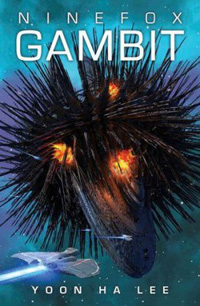Recommended Reading: Ninefox Gambit
January 7th, 2017 I started, and failed to finish, three or four novels before picking up Yoon Ha Lee’s Ninefox Gambit. If you’re looking for something different, something challenging and endlessly interesting — a puzzle to be figured out — try this one.
I started, and failed to finish, three or four novels before picking up Yoon Ha Lee’s Ninefox Gambit. If you’re looking for something different, something challenging and endlessly interesting — a puzzle to be figured out — try this one.
I’m still not sure what it’s about.
Usually I say very little about the plot or even the background of the books that I recommend here, because I think a book is best appreciated without preconceptions. But I’m making an exception this time. So if you’re already intrigued, go off and read Ninefox Gambit. Otherwise, read on for just a bit of discussion about the book.
The basic plot centers around an infantry officer, Kel Cheris, whose off-the-charts mathematical ability leads to her being recruited to lead a “swarm†of military “moths†to retake a fortress while carrying within her mind the persona of a notorious deceased general.
The reader is left to assume that all of this takes place in space and that “moths†are starships, though I’m fairly sure that was never explicitly stated. Very little about the background or world building in this novel is explicitly stated. There are no references to interstellar distances or astrophysics. Instead we are told this world is based on a “calendrical†system, which (I think) has to do with “consensus mechanics†– the idea that reality is what we agree it is. This means the tightly controlled belief-based society is subject to “calendrical rot†when heretics introduce different calendrical systems (as heretics tend to do).
In this world, a deep knowledge of mathematics allows one to manipulate both time and the laws of physics, leading to the development of “exotic†weapons with effects that do not follow standard physical laws – and are quite bizarre and horrifying. Life is cheap. Both soldiers and civilians die in great numbers.
Halfway through the book, I began to suspect this society exists within an artificial, computer-generated reality*, and maybe that is the case, but that’s never stated either.
Or perhaps I’ve got it all wrong. Nevertheless, it’s easy to see I was thoroughly intrigued by the world building. Also, Yoon Ha Lee’s descriptive language is always impressive.
Have you already read Ninefox Gambit? If so, let me know what you think.
* moths were the original “bugs†that messed up one of the earliest computers, right? and calendars that determine the rate of the passage of time would certainly create some messy effects.
Posted on: Saturday, January 7th, 2017 at 1:26 pm
Categories: Recommended Reading.
Tags: Ninefox Gambit, Yoon Ha Lee








January 8th, 2017 at 3:46 am
Yes, I enjoyed it as well. I also felt the universe it took place in was virtual due to the importance of calendars and the magical properties of mathematics in that space. I was reminded of Hannu Rajaniemi’s work.
January 8th, 2017 at 6:14 am
I’m 2/3 of the way through right now, and am enjoying it quite a bit. I find it to be somewhere between Jean Le Falmbeur and the Imperial Radch, both of which are great in their own right.
January 8th, 2017 at 6:41 am
Interesting comparisons. I confess I have not read The Quantum Thief. I’ll have to try it again one of these days.